Joe Noble: the pipes|drums Interview from the Archives – Part 2
We continue with Part 2 of the August 1997 pipes|drums Interview with the late Joe Noble, one of history’s greatest contributors to pipe band drumming.
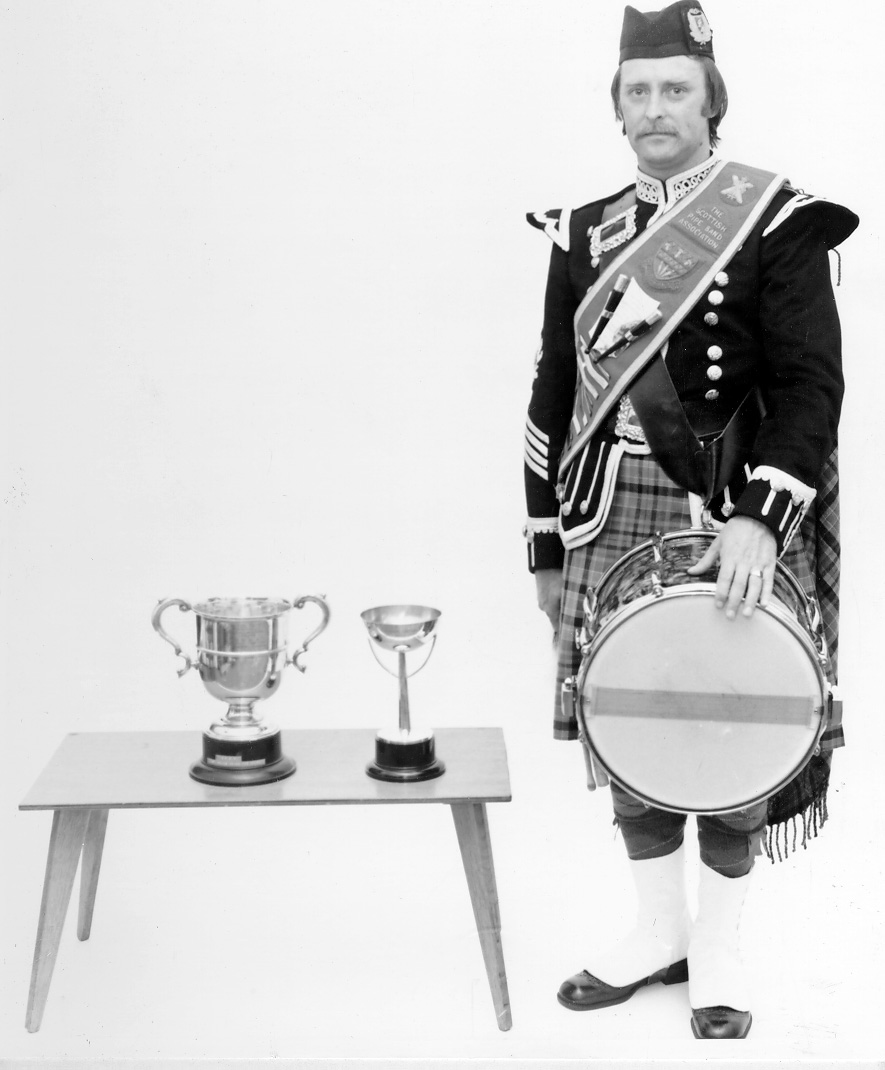
pipes|drums: Have you ever taken any piping lessons?
Joe Noble: No, but I’ve been tempted, and I do enjoy piping competitions. You’ll see me hanging about solo arenas and stuff like that. I don’t know if it’s just a throwback to the way I was brought up. Going back to the 214, it was an organization that, when I joined, needed two drummers and I was one of them. I always fancied drumming because of a general interest, but I was sorely tempted to take the pipes at an early stage, but you go with the flow.
p|d: Do you think it’s important for pipers to learn about drumming and vice versa?
JN: It’s imperative. You’ve got to understand the capabilities of the instruments and I think that if the pipe section, and especially the pipe-major, is aware of what the drummers do, and maybe what they are or are not achieving, then they can talk to them in basic terms to overcome that problem. If the lead-drummer has a respect for the pipe-major then you can overcome almost anything.
p|d: It seems like a lot of your thoughts are around teamwork, team building, and communication to make a successful drum section.
JN: Yes, but it should be for the band, and not just for the drum corps. But drummers tend to hang out while the pipers are tuning up. While the pipers go through all their intricate exercises, the drummers hang about at the corner, so it’s better that they get on with each other. That hang-about time can be put to good use, believe me.
Practices should be efficiently run, particularly nowadays when time is not always freely available to people. The time that band members commit is precious. Practices must be structured. There should be a definite time when the practice starts, and a definite thread running through the practice where you might first bring on new players, work on rudiments on practice pads, then onto drums, and then to the band.
The pipers should also have highly structured practices: bring on new players, work on technique, work round the table with practice chanters, then work with the pipes, and then finish with the band as a whole. Every band member should be able to go to a practice and know that at nine o’clock all the components will come together and they would actually make music as a band. That requires self-discipline and team spirit.
p|d: Is there a discernible regional quality to drum sections these days? For example, is there an identifiable Canadian style? Australian? American? New Zealand?
JN: Bands are certainly very international now, and it’s wonderful. With every World Championship week each year, the number of people from different countries is incredible. It really is a fir class advertisement for our music. This year, there’s a band from South America whose grasp of rhythm is far beyond anything that we could ever achieve, achieve with case because the intricate patterns that their drummers are capable of producing do not come within a musical idiom.
The Australian technique is mainly from Scotland and Ireland. There’s nothing from what I can see that has influenced from Australia. North America, like Australia, has benefitted from the generous exodus of players from the United Kingdom, and the style there is very strong and very traditional in the main, although over the last 10 years you could get an input from Drum Corps International – a style that is often very flamboyant and very interesting. It’s all very well, but it really mustn’t stray away from our idiom.
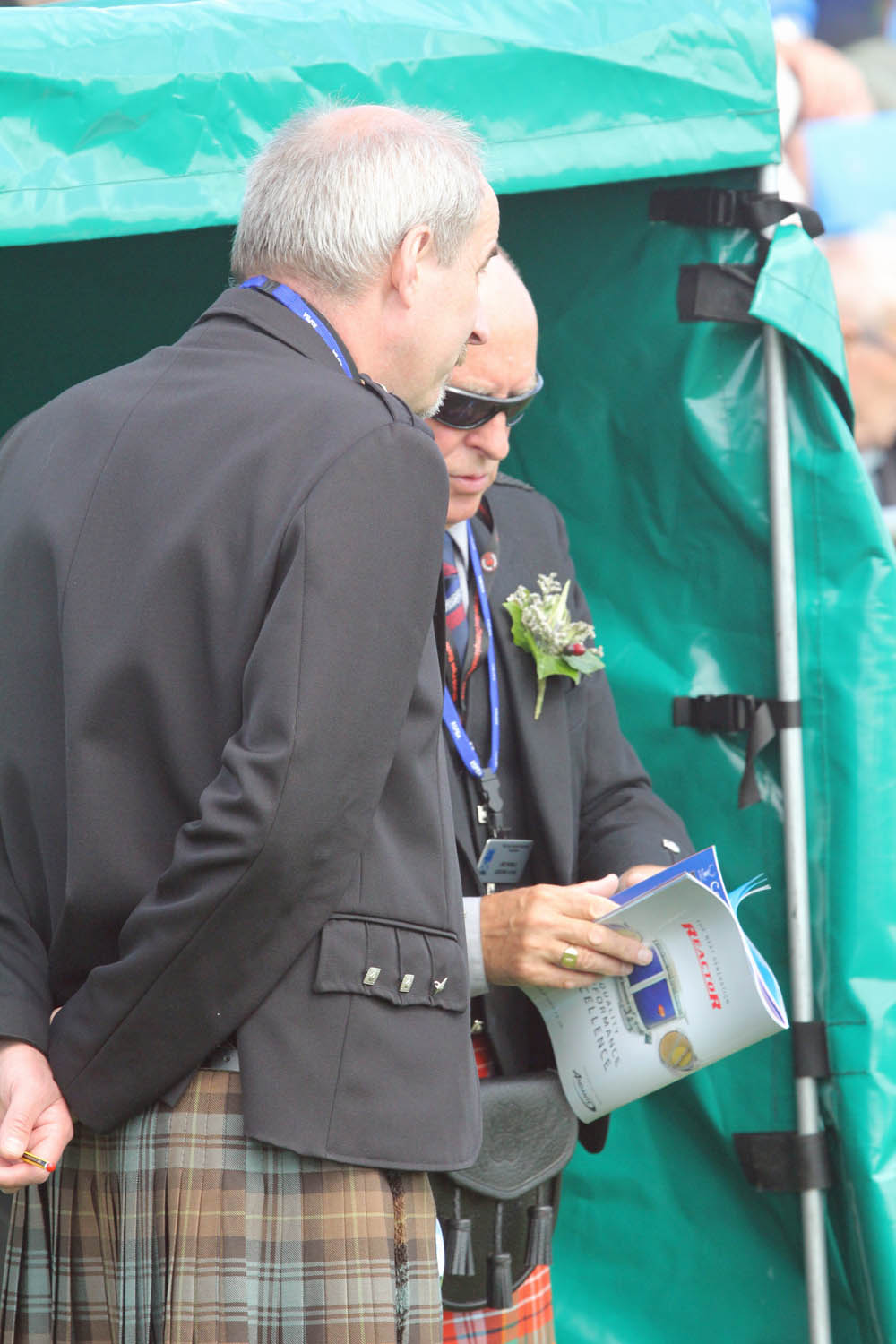
p|d: Modern Highland pipe tunes ha borrowed music rhythms and concepts from Galicia, Poland, Brittany, and other places. Is there an opportunity for drum corps to borrow from ethnic music from different parts of the world?
JN: I recently visited South Africa and was privileged to visit a township where we heard the local school kids play very raw and natural rhythms that were very compelling. Yes, you could use those rhythms in concert, and by means, I would encourage bands to incorporate folk rhythms in a concert setting. We’ve got to remember always that ours is a distinct idiom. If we completely destroy it, then we’re left with nothing. While pipe bands are capable now of putting on concerts that can be very crowd-pleasing, using different concepts from jazz and other areas, it’s still very important that when they walk onto the contest field it’s a formal process. I can’t see a note-bending competition at the Northern Meeting or Argyllshire Gathering would ever be introduced. That formal restraint on our music is actually quite good. It takes us back to our roots, and it reintroduces the music to us. It can be very disturbing to listen to an alien idiom be forced upon our music.
p|d: But isn’t modern pipe band drumming borrowed largely from Swiss drumming and Dr. Fritz Berger from Basel? When Jimmy Catherwood “discovered” it, it must have been quite a shock to the Scottish scene.
JN: When Jimmy Catherwood visited Basel, Switzerland – I think it was in the late 1930s – there was an introduction of Swiss thoughts, but I’d say they were no more than thoughts. We adapted the Swiss method of writing scores above and below the line, and that has been very important to the development of our art. The drumming that came from Switzerland in the form of certain rudiments was very expertly used by Alex Duthart, and it did have a great influence. It was another rush forward for the drum corps. It was like, “Whoops, here’s another open door, so let’s all rush through it.”
Some people thought that the Swiss exercises were the be-all and end-all, and I often heard Swiss exercises and rudiments being forced into our idiom, and they simply did not fit. We were so eager to rush into this new idea that sometimes it wasn’t always used properly. It’s settled down now.
There have been other influences on our drumming. The influence of jazz has been tremendous. Just about everybody from my era virtually worshipped Gene Krupa, Buddy Rich, and Louis Belson, and we always used to try things that they did. Funnily enough, one or two of the rudiments, or the combinations of rudiments that we picked up from them, did find a place in pipe band styles. Gene Krupa was probably one of the best paradiddle players ever, and Buddy Rich could play virtually anything.
p|d: What’s the best drum corps you have ever heard?
JN: I’ll change the question slightly and make it the drum corps that made the biggest impact on me. That would be Alex Duthart’s early Shotts & Dykehead drum corps, warts and all. They were terrific. Alex was the first player whom I actually heard playing dynamics. He was a thrilling player and very musical. Alex Duthart’s drum corps playing his famous drum fanfare, the one that has been cut to pieces over the last few years, thrilled me to bits. The original was excellent, and it’s still worth hearing.
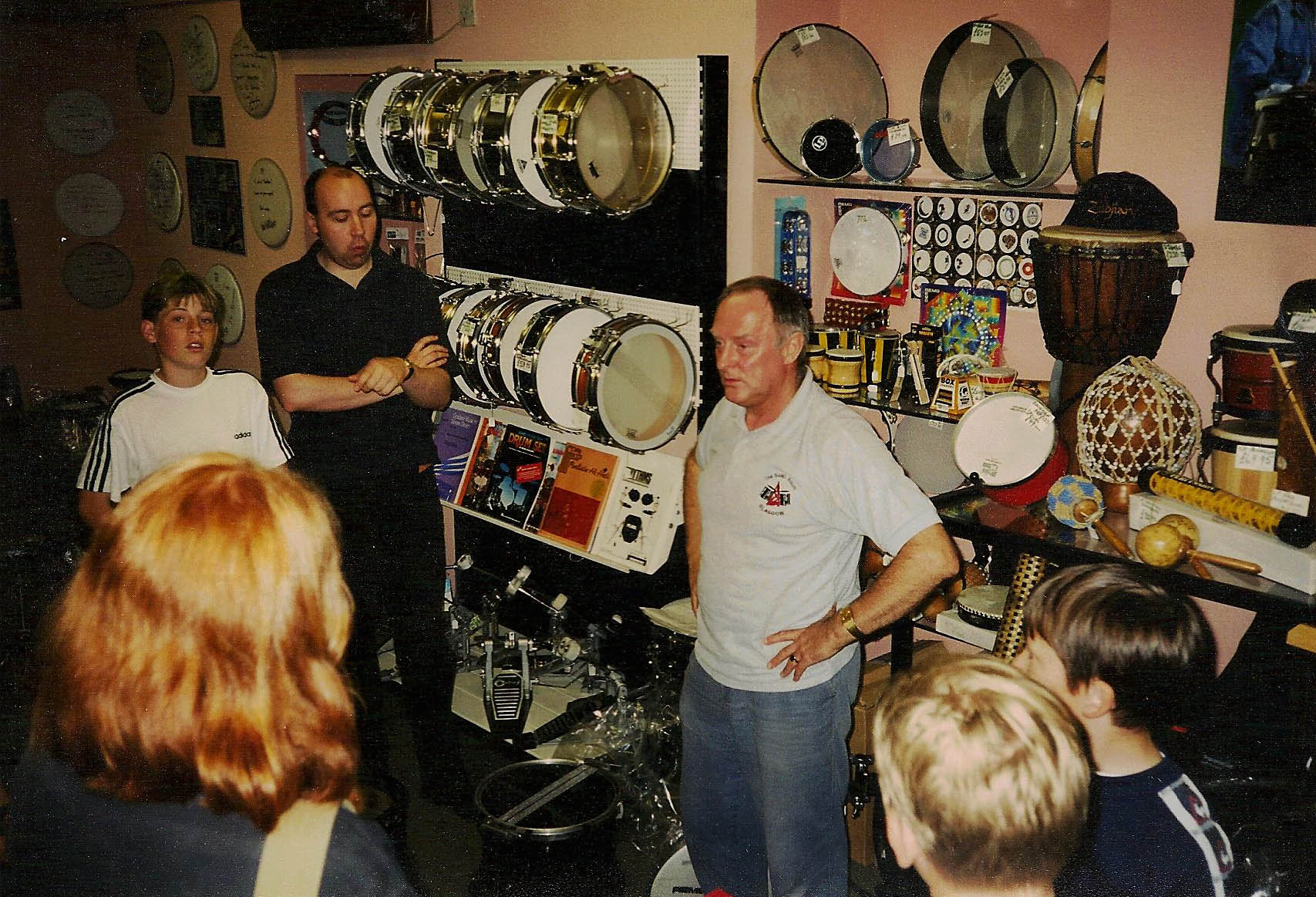
p|d: Who is the greatest drummer pipe band or otherwise you ever heard?
JN: Buddy Rich is somebody special in most drummers’ minds, Time moves on, and there are loads of drummers just now whom I have a great admiration for. Certainly, Alex Duthart was a super player, generations ahead of his time, and unfortunately, didn’t get the full opportunity to display the skills that he would have nowadays. If he were 30 or 40 years old today, he would still be a force to reckon with. He could still play anything thrown at him today. From a pipe band view, Alex was a great drummer.
But I have other favourites. Alex Connell of the Strathclyde Police Pipe Band was a highly musical player whose influence early on was largely underestimated. That band, with lain MacLellan at the helm and Alex’s accompaniment, was very musical.
There are so many others. I won’t mention any more because I’ll miss out players whom 1 really admire, but the influences are really strong and you’ll forgive me if I don’t take any of the present-day drummers into account because they are still playing. From a judging perspective, I don’t want to be seen as putting anyone on a pedestal.
p|d: It seems like certain bands have a tradition of drumming excellence: Shotts & Dykehead, Boghall & Bathgate, and others. Do you think that, as a result, it’s even more difficult for good drum corps to get noticed over the established corps?
JN: The fact that the best drum corps prize is so hotly contested today and that there are so many contenders now would suggest that if anybody is good enough, they’ll get through. It’s handy if there is a good tradition of playing excellence, and the chances are better that excellent players will be attracted, so it’s going to be always difficult to unseat the top bands.
“If you see a good drum corps the chances are that there also has been a tradition of good pipe-majors. Good pipe-majors appreciate good drum corps. They know that if they don’t have a good drum corps, they’re not going to win a World Championship.”
There are several bands in contention for prizes in Grade 1 at the World’s, and probably just as many, maybe more, drum corps. But I do take the point about bands with a tradition, albeit that Boghall & Bathgate’s tradition of drumming excellence is relatively recent. When I started playing, there wasn’t a Boghall band, so it is a recent tradition. Shotts & Dykehead is different. Shotts currently has Jim Kilpatrick, and prior to that, they had a thread of good players: John Scullion, Arthur Cook, Alex Duthart, and even in the early days, Shotts always had a good drum corps.
If you see a good drum corps the chances are that there also has been a tradition of good pipe-majors. Good pipe-majors appreciate good drum corps. They know that if they don’t have a good drum corps, they’re not going to win a World Championship.
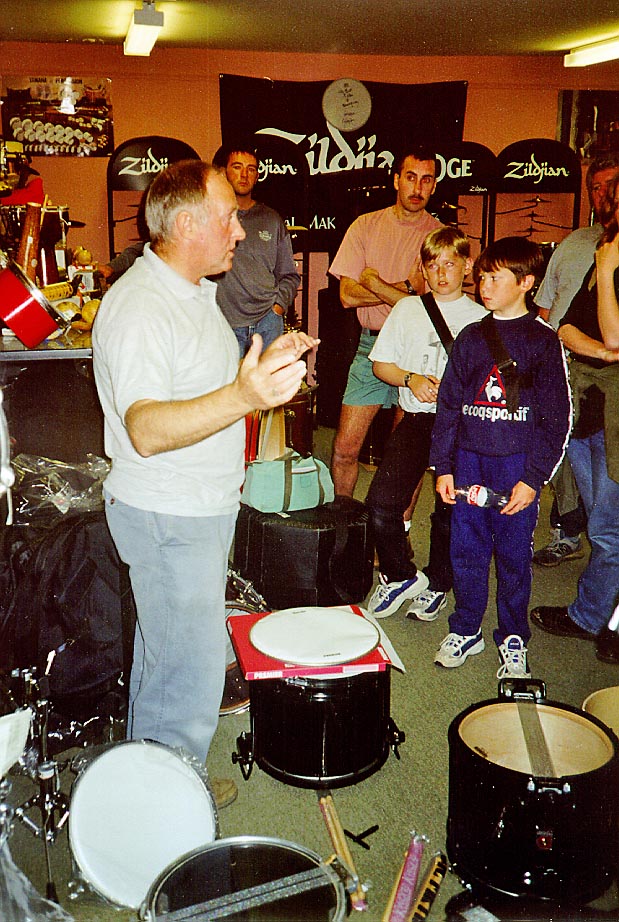 p|d: You’re one of the most respected drumming judges out there. What do you look for in a performance?
p|d: You’re one of the most respected drumming judges out there. What do you look for in a performance?
JN: From the very start, with the band at the trigger, I’m looking for a good rudimental introduction good quality rolls, played together and at a good tempo. By the time they’ve hit the circle, I know how much work was put in six months back. The drum scores should be written to accompany the melody. Are they comfortable with the melody? Are they straying apart at any given point? The accompaniment must be true and enhancing the piping. The pipes are the ones with the big bucks; they’ve got big points.
The drummers have the pennies, so the drum corps has to look after the pipe section. After that, you’ve got to be able to show that you can play together with a good range of rudiments and good rhythmic patterns and dynamics. Nowadays, in particular, drum corps have to display good dynamics because it’s essential for the drum corps to add to the overall musical concept of the band.
p|d: If you could go back to a particular five-year period in pipe bands, when would it be?
JN: If I were to be totally selfish, it would have to be the middle-to-late-1970s when I did rather well. But the current period of time, quite honestly, is very exciting. It’s excellent to see so many top-notch overseas bands making an impact on the world stage, and long may it continue. There’s every chance that the next five years will be the best years.
p|d: You’re in the business of selling percussion equipment to pipe bands. How do you feel about conflict-of-interest rules for judges?
JN: I have no problem with this. When I’m judging, I have my reputation to consider, and I like to think that the judgment that I give is the correct one on the day for the performances that I have heard. I also know so many of the players personally for so many years that if I were to give all of my friends first prize, there would be a wee bit of clutter at the top of the list.
I can understand the concerns of conflict of interest, but this little pipe band game that we are in is so close-knit that it would be hard to know where to start and where to stop. If it’s restricted to a financial interest, well, there are so many people either teaching bands, making reeds, or making drumsticks, or whatever, it’s a huge grey area. I’m not ducking the issue, but I think you’ve got to look at the individual and not the broad item. In short, if you really think that there are people with a conflict of interest and it can be shown, then something should be done about it. You don’t use a blunderbuss to kill an ant.
p|d: Are there problems right now with conflict of interest?
JN: I don’t sense it personally. There have always been disgruntled people who consider that conflict of interest exists for whatever reason. If it does exist, then you’ve got to prove it. Who did it, when it was done, and who it was done to.
“I think band members should be allowed to provide intelligent input on who judges. We should ask the bands what their thoughts are.”
Where do you draw the line? If somebody is making reeds or some of the smaller items, a conflict could exist even at that level. Having said that, I don’t think it applies to non-manufacturing people. If you’re not manufacturing, you’re happy to sell whatever is available to you. With my own organization, we’re happy to sell to anyone, and we’re happy to sell anything that people want to buy.
p|d: Should bands get a say in who judges?
JN: Absolutely. I think that band members should be allowed to provide intelligent input on who judges. We should ask the bands what their thoughts are: What qualification or level of expertise do you feel is essential to a judge before he is able to adjudicate your band? Is the certificate or diploma suf. ficient, or do you think we should have a playing pedigree, or both, or what level of pedigree should we have?
p|d: Would it come down to pipe-majors and leading-drummers making that decision, or should it be across the board annual vote?
JN: The RSPBA has a pipe-major and leading-drummer forum where grievances can be aired. I haven’t been to one of these things because I’m not a current player and I’m not a member of any committee that would be invited. It should be a forum purely for the players because there is a genuine fear, whether it is correct or not, that the bands don’t want to complain about judges because they think they’ll be discriminated against. It’s a shocking state of affairs that bands feel that way. It must get ironed out because the players are the important people in this game. If the pipe bands don’t turn up there’s no competition.
I think that each band should be given a list of all judges, and they should then be able to tick the ones they are prepared to accept and cross out the ones they don’t want. An independent body could then advise the judging panel of the results. Judging groups must then be chosen with the majority feeling of bands taken into consideration.
p|d: Was there ever a time when you were competing that you or the pipe-major thought it was right to complain about a judging bias or injustice, but you didn’t because of the threat of repercussion?
JN: There have been occasions when I would like to have done something, and in equal layers of trepidation and apathy it wasn’t progressed with apathy in that I thought it was no use since I believed nobody would do anything about it anyway. This is sad, because the pipe band game belongs the players. They are the be all and end all. The officials are there just to make things tick along, but the players are integral, and I wish they could just appreciate that. Any grievances they have are ultimately in their hands. They can do something about it if they feel strongly enough about it. It saddens me a wee bit that certain situations just trundle on and aren’t met full head on and resolved.
p|d: Do you feel the time is right for a competing drummers association?
JN: Yes. It would save a lot of problems. If drummers want to hold a drumming event, they shouldn’t be constrained by rules and regulations that exist within the RSPBA. I think that things will develop over the next few years, whether it is on the drumming side or even on the pipe band side as a whole, where we’ll see the whole pipe band movement change dramatically.
p|d: It’s going to be up to someone to have the courage to really stick his neck out.
JN: It’s not up to one person. It is up to a group of enlightened people. It’s a matter for the leading lights to make it happen.
p|d: What do you think about the organization of the World Pipe Band Championship?
JN: The current venue at Glasgow Green is not bad, but the biggest problem normally is with the arena layout. The circles are usually too close to each other, and the final tuning area tends not to be positioned intelligently. This has been a problem in the Grade 1 competition in recent years, and it’s totally unacceptable. Just think about the money spent by bands to get there; they deserve so much better. If the organizers don’t have the ability to properly lay out the full arena, then ask people who do.
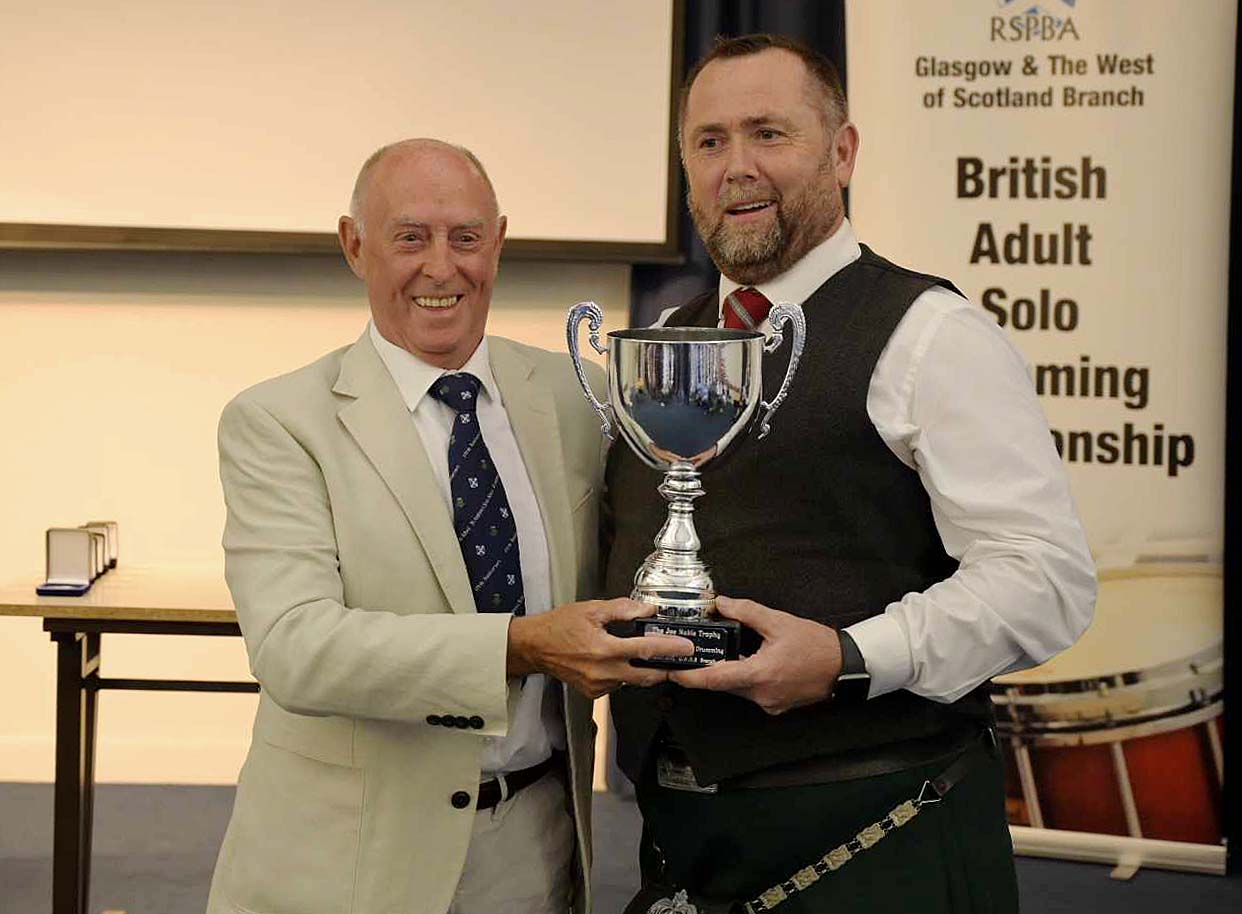
p|d: The World’s setup isn’t exactly ideal for the paying spectators either.
JN: It seems to me that the arenas and the format are deliberately planned to prevent the serious listener from getting the opportunity to properly hear the contest. We now have over 200 bands competing. Come on! Think bigger and better! It seems like every year the only people who know about the World’s are the ones who are in some way involved. There is little or no advance publicity.
I can’t imagine that the bands are happy with this. Again, I feel that each band should be given a questionnaire to complete after the event to be evaluated by an independent group. The results should be presented to the organizers, and appropriate action should be taken. At present, many people complain about things to each other but not in writing to the appropriate authority. The “powers that be” bury their collective heads in the sand and pretend that all went well.
p|d: How do you feel about drumming adjudicators judging ensemble?
JN: It’s a very good idea, provided they are efficient at it, in the same way as I think some piping adjudicators make very good ensemble judges. If you have been a leading drummer for a number of years, your whole duty is to listen intently to the pipe corps. All the chanters are facing you so you can normally hear what is happening. You’re brought up listening to the other section, and as long as you educate yourself in a slightly broader field to pick up more information on the other instrument, then drummers can be excellent ensemble adjudicators. At the same time, there are some pipers who play bands who wouldn’t notice if a drummer collapsed and died during a performance.
It’s sad if anyone believes that drummers are only to be tolerated. If drummers are appreciated and listened to it can make the piper a better player. It’s no coincidence that so many of the top solo pipers are also band players.
p|d: Who out there might be the next Jim Kilpatrick? You might not want to name names but do you think that drumming is in good hands for the future?
JN: Yes, I think that drumming is in very good hands. We sponsored and ran The Band Room Masters Solo Drumming Championship this year, and when you listen to the players, you appreciate how good they are. When I see how young some of them are, it gives me quite a boost. We don’t have any worries. The young players coming through will perhaps be educated quicker than the old guys like me were. We maybe had to go out of our way to get education and, in many cases, were lucky to find the right person. I don’t know where I would have gone if I hadn’t met A.D. Hamilton. Today, there is a lot of good tuition available, and the kids have access to it. I don’t have any fears about piping, either. There are so many good players and bands.
Everything is going very well, thank you. Who knows what kind of levels will be achieved?


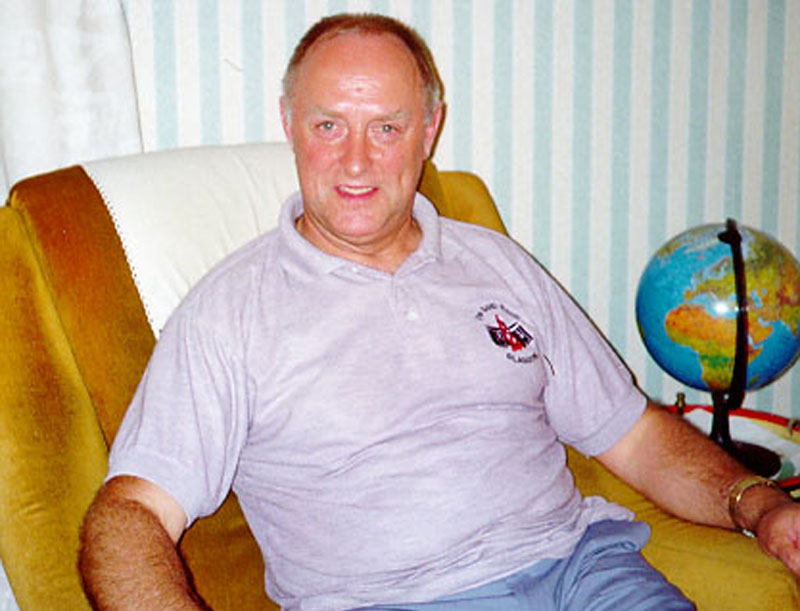
NO COMMENTS YET